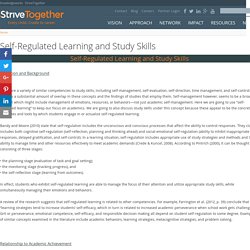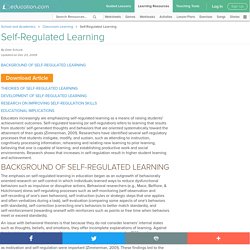

Self Efficacy: Its Role and Sources. Self-Efficacy, Motivation, and Goal Revision. Self-Regulated Learning and Study Skills. Self-Regulated Learning and Study Skills Definition and Background There are a variety of similar competencies to study skills, including self-management, self-evaluation, self-direction, time management, and self-control.

There is a substantial amount of overlap in these concepts and the findings of studies that employ them. Education.com. Educators increasingly are emphasizing self-regulated learning as a means of raising students' achievement outcomes.

Self-regulated learning (or self-regulation) refers to learning that results from students' self-generated thoughts and behaviors that are oriented systematically toward the attainment of their goals (Zimmerman, 2001). Researchers have identified several self-regulatory processes that students instigate, modify, and sustain, such as attending to instruction, cognitively processing information, rehearsing and relating new learning to prior learning, believing that one is capable of learning, and establishing productive work and social environments. Research shows that increases in self-regulation result in higher student learning and achievement.
TEAL Center Fact Sheet No. 3: Self-Regulated Learning.